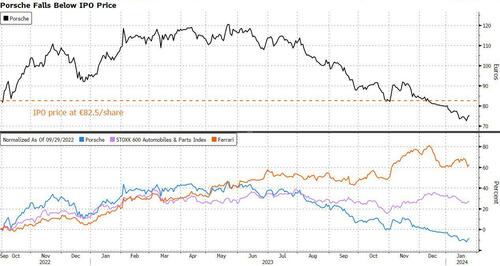
By Alexandra Muller, Bloomberg Capital Markets Watch reporter
Porsche AG’s celebrated market debut in September 2022 was built on investor enthusiasm for rival Ferrari NV’s success. That didn’t last long.
The German company’s shares have dropped 37% since their peak last May and are now languishing 8% below their listing price, taking the carmaker’s market value closer to parity with that of its former parent Volkswagen AG. That’s a far cry from a gap that once stood at €40 billion ($43.6 billion).
Investor sentiment has been deteriorating since Porsche reported first-half sales that missed estimates in July, raising concerns about automotive pricing, while a call last week with analysts failed to reassure. Porsche’s share price has been dragged lower by a downturn in China — for long Porsche’s biggest market — and production snags that have hit the rollout of key models, including the electric version of its top-selling Macan SUV.
“With the IPO, Porsche was positioned as a luxury goods investment case, very different from mass or premium original equipment manufacturers,” said Daniel Schwarz, auto analyst at Stifel. However, he said the main characteristics of luxury goods companies are high profitability, resilience and pricing power, and Porsche stock has suffered from declining profitability and falling sales in China.
Soon after the IPO, Porsche’s shares were trading at a ratio of about 20 times forward earnings per share, close to the level of luxury brands such as LVMH, even though some distance from Ferrari’s 40-times multiple. Since then, they have slid back to 13 times.
In contrast to the German automaker, “Ferrari is fully accepted as a luxury goods company,” Schwarz said. “Production is sold out for two years, the average selling price is rising fast and residual values of pre-owned Ferraris are very high.”
The Porsche IPO in September 2022 initially revived a market for new listings that had been largely shut for most of the year, with companies shying away from flotations at that time because of the European energy crisis, rising interest rates and record inflation. Despite a strong start, it has now joined other companies trading below their IPO prices, including Thyssenkrupp Nucera and Cab Payments Holdings Plc.
Most analysts are still positive on Porsche stock, however, with 12 buy ratings, 13 holds and only one sell, according to data tracked by Bloomberg. That’s even as the average target price has fallen to a level now just shy of €100 compared with more than €120 in August. That still implies potential for the stock to gain more than 30%.
By Alexandra Muller, Bloomberg Capital Markets Watch reporter
Porsche AG’s celebrated market debut in September 2022 was built on investor enthusiasm for rival Ferrari NV’s success. That didn’t last long.
The German company’s shares have dropped 37% since their peak last May and are now languishing 8% below their listing price, taking the carmaker’s market value closer to parity with that of its former parent Volkswagen AG. That’s a far cry from a gap that once stood at €40 billion ($43.6 billion).
Investor sentiment has been deteriorating since Porsche reported first-half sales that missed estimates in July, raising concerns about automotive pricing, while a call last week with analysts failed to reassure. Porsche’s share price has been dragged lower by a downturn in China — for long Porsche’s biggest market — and production snags that have hit the rollout of key models, including the electric version of its top-selling Macan SUV.
“With the IPO, Porsche was positioned as a luxury goods investment case, very different from mass or premium original equipment manufacturers,” said Daniel Schwarz, auto analyst at Stifel. However, he said the main characteristics of luxury goods companies are high profitability, resilience and pricing power, and Porsche stock has suffered from declining profitability and falling sales in China.
Soon after the IPO, Porsche’s shares were trading at a ratio of about 20 times forward earnings per share, close to the level of luxury brands such as LVMH, even though some distance from Ferrari’s 40-times multiple. Since then, they have slid back to 13 times.
In contrast to the German automaker, “Ferrari is fully accepted as a luxury goods company,” Schwarz said. “Production is sold out for two years, the average selling price is rising fast and residual values of pre-owned Ferraris are very high.”
The Porsche IPO in September 2022 initially revived a market for new listings that had been largely shut for most of the year, with companies shying away from flotations at that time because of the European energy crisis, rising interest rates and record inflation. Despite a strong start, it has now joined other companies trading below their IPO prices, including Thyssenkrupp Nucera and Cab Payments Holdings Plc.
Most analysts are still positive on Porsche stock, however, with 12 buy ratings, 13 holds and only one sell, according to data tracked by Bloomberg. That’s even as the average target price has fallen to a level now just shy of €100 compared with more than €120 in August. That still implies potential for the stock to gain more than 30%.
Loading…







